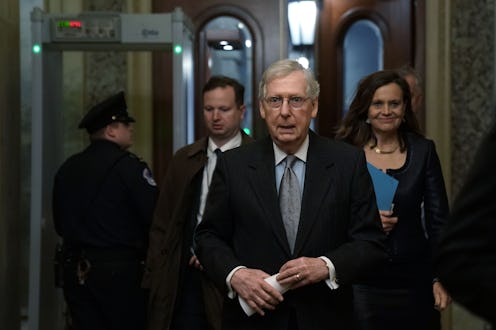News
The Government Shutdown Is Seriously Messing With Congress' January Schedule

The partial government shutdown is currently slogging through its third week, and there's still no end in sight. Now, Senate Majority Leader Mitch McConnell has said that Congress won't go into recess at the end of the week as originally planned if a deal isn't reached by then. But the odds don't look good, and it's now entirely unclear when Congress does go on recess.
There's no official rule as to how many recesses Congress may take per year; the Constitution only requires that the legislative branch meet at least once a year on Jan. 3. Generally, lawmakers take around four months of recess a year, according to CNBC; this doesn't include weekends and holidays that take place during a recess.
Trump instigated the shutdown in December when he announced that he wouldn't sign any government funding bill that didn't include $5.7 billion for a U.S.-Mexico border wall. Congressional Democrats have refused, however, and since assuming control of the House in January, have passed several bills to fund the government without allocating any wall funding. McConnell has blocked all of those spending bills in the Senate, however.
Negotiations between the two parties have made no headway, and as a result, an estimated 800,000 federal workers aren't receiving paychecks — even though around half of those employees are still required to show up for work. Two unions that represent federal workers have sued the administration over missed paychecks.
On Tuesday, Trump attempted to circumvent Democratic leaders and hold negotiations directly with rank-and-file Democrats in Congress. According to Politico, White House aides reached out to centrist Democrats in the hopes of reaching a deal with them that could get enough votes to pass the House and Senate, land on Trump’s desk and finally end the shutdown. However, no Democrats showed up to the meeting, Politico reports.
"I'll meet with [Trump] anytime he wants," Schumer said on Tuesday. "But the last time I spoke to him was when he threw a temper tantrum and walked out, and we haven't heard from him since then." Trump has denied Schumer's recollection of the meeting, telling reporters on Thursday that "I don't throw tempter tantrums."
Presumably, Congress will take its recess once the shutdown impasse is resolved. The fact remains, however, that this can't happen until either Trump or congressional Democrats back down from their positions regarding border wall funding. As neither camp shows any inclination to do so, it's unclear how the shutdown will end, let alone when.
Despite the standstill over the shutdown, lawmakers in both parties appeared to be on broad agreement Tuesday that Congress shouldn't go on recess until the shutdown is resolved. House Majority Leader Steny Hoyer confirmed to reporters that the House of Representatives, in addition to the Senate, will postpone its recess if the shutdown isn't resolved by the end of the week.
It's worth noting that lawmakers still receive paychecks during the shutdown and when Congress is recessed. Neither the 380,000 federal workers who've been furloughed because of the shutdown, nor the additional 420,000 who are required to work during the shutdown, are being paid.